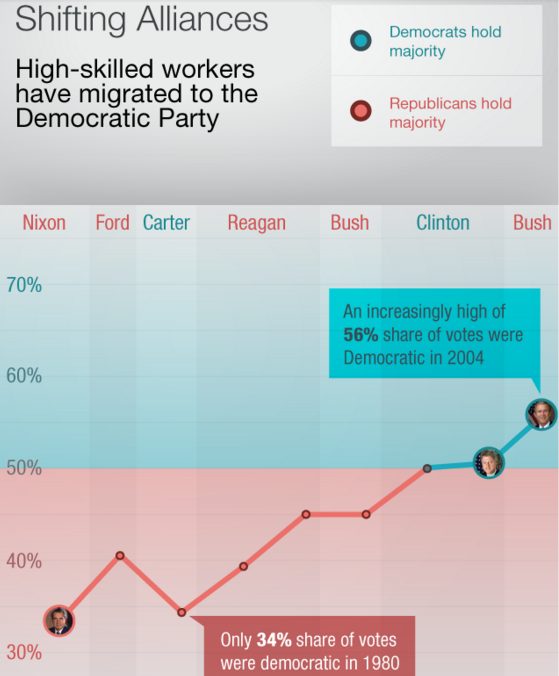Silicon Valley has not embraced Hillary Clinton in the same way it did Barack Obama. Donors from the Valley contributed just a third of what they gave in 2012 (roughly $3.3M vs. $8.8M by June of each respective election).
And, even those donating millions of dollars have been quite explicit that their intention is mostly about stopping Donald Trump, while begrudgingly accepting an imperfect Democratic platform.
Behind the less than enthusiastic embrace is a collective skepticism in the tech industry about Clinton’s pro-innovation credentials.
The shade is unwarranted.
There is a reasonably quantifiable way to forecast how innovation-friendly a candidate will be based on their legislative record: add up the percent of laws that a Congressman writes related to high-skilled workforce training, data transparency, and performance-based funding.
An obsession with making the federal government run more like a tech company and training citizens to work in new industries is a good sign that a policymaker will end up siding with Silicon Valley on most issues.
Indeed, Hillary Clinton is the latest in a long line of “New Democrats” who have attempted to rebrand the party since the 90s as more tech friendly.
Since her husband’s tenure in office, Silicon Valley insiders have recognized the supportive stance in the New Democrats’ fiscal policies. Indeed, many investors and entrepreneurs in Silicon Valley heavily supported the Obama candidacy in 2008.
That support was (on the whole) reciprocated by the President. And finding evidence that Clinton is likely to pick up this mantle of technology booster isn’t difficult. Simply look at the percentage of bills the candidate authored in Congress related to technocratic management and skilled worker development. That should be a reasonable predictor of her friendliness toward Silicon Valley-supported policies.
Let’s see how Clinton’s past stack’s up.

What kind of Democrat is Hillary Clinton?
While Hillary Clinton may have adopted the egalitarian rhetoric of her populist primary opponent, Bernie Sanders, here is a taste of the innovation-centric bills she authored while in the Senate.
- Recruit more talented school principals (National Principal Recruitment Act)
- Modernize Veteran care technology (Veterans Disability Benefits Claims Modernization Act of 2008)
- Require the Center for Disease Control to be transparent with public data (21st Century Wellness Act).
This was very similar to the few technocratic laws that Obama authored while in the Senate.
- S. 3077 (110th): Strengthening Transparency and Accountability in Federal Spending Act of 2008
- S. 3047 (110th): Enhancing Science, Technology, Engineering, and Mathematics Education Act of
The debate over whether Clinton will be less innovation-friendly than Obama has been frustratingly subjective — investors Silicon Valley just seem to get a bad feeling from Clinton’s populist rhetoric.
But rhetoric is a tool of politicians, while legislation is an act of governance. Democrats rarely support “New Democrat”-style tech-friendly laws and have a strong history of authoring new regulations to constrain the free market.
That is, Democrats either prioritize economic growth and better management or they prioritize regulation — but not both.
Obama and Clinton authored laws that almost exclusively focused on skill development and improved government management while in the Senate.
Why can’t Democrats focus on both innovation and regulation?
The Democratic base is actually composed of two broadly defined and distinct constituencies: urbanized highly-educated professionals and middle America blue-collar workers.
Beginning in the 1980s, there was a mass exodus of professionals, such as doctors and engineers, from Reagan’s Republican Party, when just 34% of professionals voted Democrats during Nixon’s election to over 50% in the 90s in Bill Clinton’s.

Al From, who helped create the New Democrat coalition in the 80s, told me, “With our economic growth agenda (fiscal discipline, investment in people and technology, and expanded trade), we also tapped into and built new Democratic constituencies in technology and finance.”
This new base was no accident and neither was the new agenda. Twenty years after Bill Clinton’s reformation of the party, the Clintons remain representative of this professional class of Democrat.
Fascinatingly enough, this split within the Democratic Party goes back over 150 years. The first major schism in what is now the modern Democratic party appeared in the 1840s, when upstart frontier professionals in the West teamed up with the high skilled industry of the day, railroads, to advocate for free trade and investment in infrastructure.
This so-called “Young America” movement would eventually take over the party with the election of President James K. Polk, who helped radically overhaul America’s once-isolationist trade policy.
So should Silicon Valley be optimistic for Clinton as President?

In private, a number of very wealthy former Barack Obama donors say that they are anxious that Clinton’s populist rhetoric portends a presidency that will not be friendly on emerging issues.
For instance, Clinton now conditionally opposes the trans-pacific partnership; spoke negatively of charter schools in front of a teacher’s union rally; and made ambiguous statements on whether independent contractors in the gig economy should have to be treated like regular workers (which could be devastating to a company like Uber).
In off-the-record conversations, Clinton’s tech policy team said that her words were gravely misinterpreted and she has no plans to regulate Uber or take any positions that threaten the tech industry. Without position statements one way or the other, it’s hard to say.
But one good indication that she’ll stay loyal to her roots is how she has conceded to Bernie Sanders on one issue: higher education.
It was widely reported that Clinton appeased the populist base by proposing a free college education plan like her former opponent. But — and this is crucial — the details of her plan are incredibly tech-friendly.
Her proposal calls to create an entirely new way to fund college by incentivizing students to become entrepreneurs in distressed communities. Her plan also requires colleges to do something that many colleges have resisted: offer lower-priced versions of classes through online education.
Indeed, the publication Inside Higher Ed declared that Clinton’s education plan was “giveaway to Silicon Valley“.
So, will Hillary Clinton be as good for innovation has Barack Obama? Beyond the rhetoric, it’s hard to find evidence to the contrary.
The Ferenstein Wire is a syndicated column. For more stories, sign up for the newsletter here.































Comment